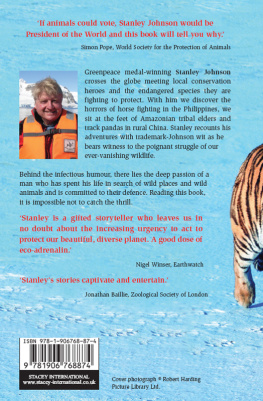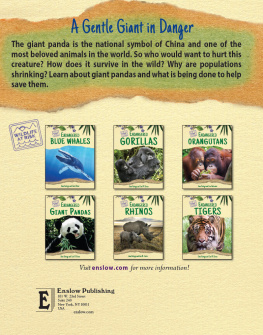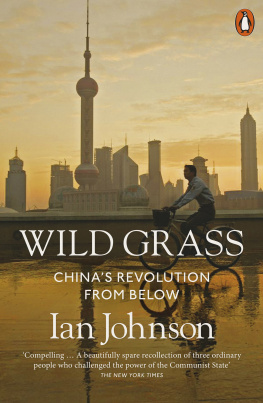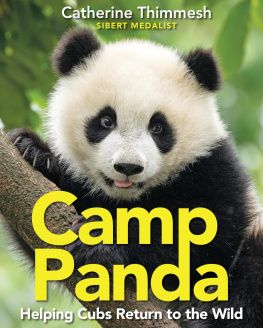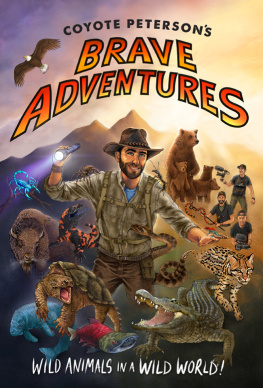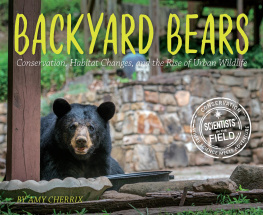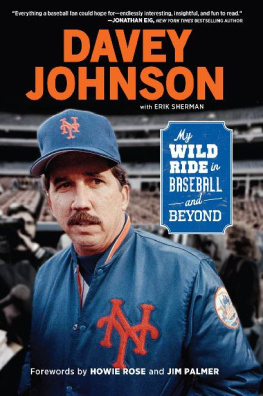W HERE THE W ILD
T HINGS W ERE
T RAVELS OF A C ONSERVATIONIST
Stanley Johnson has been a conservationist for most of his life. A former Member of the European Parliament, he has been awarded the Greenpeace Prize for Outstanding Services to the Environment and the RSPCA Richard Martin award for services to animal welfare. He is an ambassador for the United Nations Environment Programmes Convention on Migratory Species and Chairman of the Gorilla Organization. He has written more than a dozen books on environmental subjects, a memoir and nine novels.
W HERE THE W ILD
T HINGS W ERE
T RAVELS OF A C ONSERVATIONIST
Stanley Johnson

Where the Wild Things Were
Travels of a Conservationist
Copyright Stanley Johnson 2012
Cover Photograph Robert Harding Picture Library Ltd.
STACEY PUBLISHING LTD
128 Kensington Church Street
London W8 4BH
Tel: +44 (0)20 7221 7166; Fax: +44 (0)20 7792 9288
Email:
www.stacey-international.co.uk
ISBN: 978-1-906-768-87-4
eISBN: 978-1-909-022-04-1
CIP Data: A catalogue record for this book is available from the British Library
All rights reserved. No part of this publication may be reproduced,
stored in a retrieval system, or transmitted in any form or by any means,
electronic, mechanical, photocopying, recording or otherwise, without the prior
permission of the copyright owners.
Printed and bound by CPI (UK) Ltd, Croydon CR0 4YY
C ONTENTS
Introduction
My maternal grandfather was the main source of support as far as my first travels were concerned. He put 40 into my Post Office savings account before he died, in 1956, and that money was still there two years later when I set out on my gap year journey across Europe, Asia Minor and South America. You could go a long way on 40 in those days.
Actually, it wasnt strictly speaking a gap year; more like a gap nine months. I had stayed on an extra term at Sherborne for various reasons, including playing rugger for the XV, and only got started on my travels in January 1959.
Being at boarding school (first prep, then public) since the age of eight, I had of course already acquired the letter-writing habit. Writing home was not an optional extra. It was compulsory. You didnt (and usually couldnt) ring your parents up, but you sent them a weekly letter and in turn hoped and expected to hear back from them. At prep school at least, the letter-writing exercise was properly invigilated and you had to hand your effort in for inspection before you could escape to more congenial activities. I dont think the masters who looked over ones handiwork bothered too much about the content, unless it was plainly seditious, but they certainly minded about the length. Two sides was the minimum requirement. If you managed to run on to a third or even a fourth page, you had done well.
My mother kept all my letters home, as she kept those written by my brother and (two) sisters. After her death my younger sister, Birdie, found a great epistolary hoard, sorted the various missives and handed them back to the original senders. I started to read through some of my own adolescent efforts but quickly gave up. The banality was too excruciating. Molesworth himself could not have done better. Dear Mummy and Daddy, my marks this week were 144. I came 1st. We beat Marlborough 126. That kind of thing. I did much better when I started on those gap year journeys. Travel was obviously more inspiring than school. I wrote long letters to my parents and posted them wherever I could.
My first trip took me to Paris, Rome, Trieste, Athens and the Peloponnese and then on to Istanbul, Ankara and Izmir. I returned to England on the Orient Express, stayed on our farm on Exmoor a couple of weeks to help with lambing and then headed off again, this time for Brazil, Bolivia and Peru.
Those early letters, as contained in the large brown envelope my sister handed me, were immensely valuable when, more than fifty years later, I sat down to write my memoir Stanley, I Presume (published in 2009). Ones memory of events, after a lapse of several decades, is not always reliable. Did I visit Tiryns before or after Mycenae? Did I take the train all the way from Cusco to Machu Picchu? Fortunately, I had the details to hand.
My gap year like all good things came to end. Days after arriving at Cardiff on a cargo ship which I had picked up (or rather which had picked me up) in the port of Vitoria, Brazil, I went up to Oxford for the first term of four stress-free years.
I found that travelling fitted in very well with the rhythms of life as an Oxford undergraduate. During two of the vacations I was employed as a travel courier (of questionable competence) and during my second Long Vacation spent the whole four months abroad, following Marco Polos route to China on a motorcycle.
Once again I took extensive notes on that journey, some of which Tim Severin, who accompanied me, was kind enough to use in his excellent account of our journey across Europe and Asia, called Tracking Marco Polo.
As I made clear in my memoir, my life since then has had numerous twists and turns, as most lives do. I seem to have visited an inordinate number of far-flung places. Partly this has been the result of the nature of my work with various international organizations. Partly it has resulted from my love, nurtured on Exmoor, of wild places and wild animals. My father, a farmer for most of his life, probably preferred animals to people. I do not necessarily go as far as that. But I can certainly see where he was coming from.
Birdie, my afore-mentioned sister who has a discerning eye and quite a way with words herself, once told me that she regarded Antarctica: The Last Great Wilderness as one of my better books! If that is the case, I am sure it is because visiting Antarctica for the first time three decades ago was a tremendously invigorating and emotional experience. And I think that showed in the writing.
Many of the jobs I have had over the years have been involved with environmental issues. Some of them have been specifically concerned with nature protection. I was a Member of the European Parliament (MEP) between 1979 and 1984 and a Vice-Chairman of the Parliaments Environment Committee. I was closely involved in the successful efforts to introduce a ban on the import of seal products into the European Economic Community (as the European Union was then known) as well as other EU legislation relating to elephants, whales and the trade in endangered species. Later, after I had returned to the European Commission as an environmental adviser, I helped to draft the EU Directive on the protection of habitat and species, which led to the setting up of the nature-protection network known as NATURA 2000. The network now covers more than 17 per cent of the land area of the EU and a number of Marine Reserves have also been designated.
I left Brussels in 1990 to work for the Food and Agriculture Organization of the United Nations (FAO) in Rome in the hope that FAO would be able to sponsor a worldwide forest convention in time for the Earth Summit that was to be held in Rio de Janiero, Brazil, in June 1992. When that attempt failed (partly owing to implacable opposition from Malaysia), I spent a decade working as an environmental and animal welfare consultant. I was based in England but the assignments provided much scope for international travel and contact with nature and wildlife all over the world.
Towards the end of 2003, I decided that I would like to revisit the political career I had begun when I was elected as an MEP. This time, however, I decided I would try to become an MP rather than an MEP. After sitting an exam known as the Parliamentary Assessment Board organized by the Conservative Party to sort out the sheep from the goats, I was delighted to be allowed to join at the advanced age of sixty-three! the Partys official list of parliamentary hopefuls. In August 2004, just before my sixty-fourth birthday, I was even more delighted to be selected as the Conservative candidate for Teignbridge in Devon with a view to fighting the forthcoming General Election.
Next page
